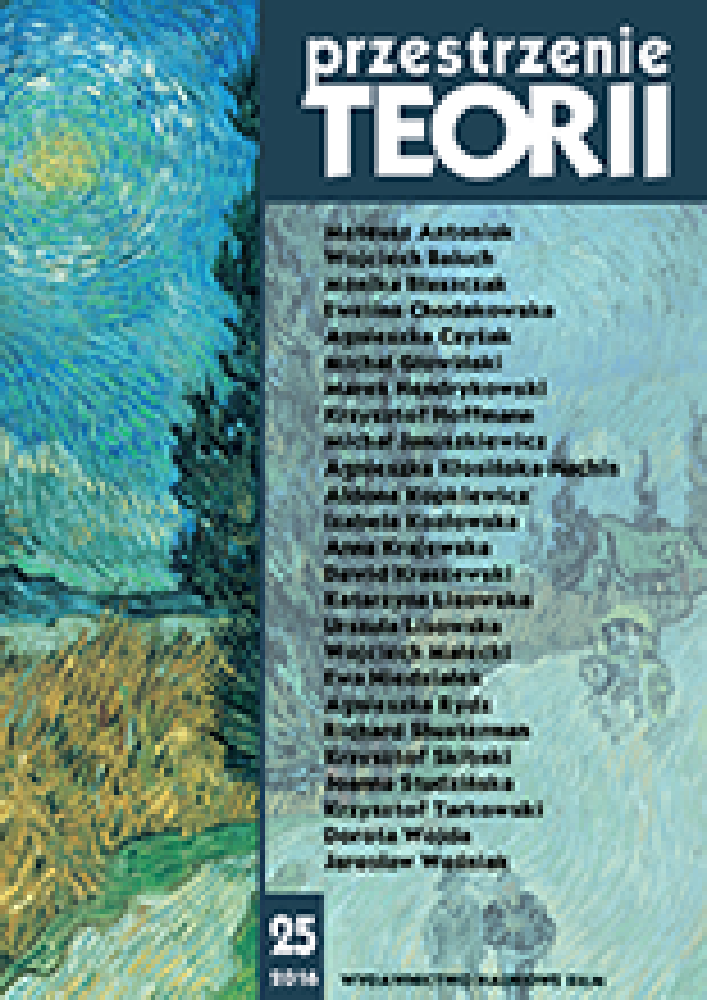Abstrakt
This paper is an attempt to recapitulate the main themes in Jacques Derrida’s thought on the university. The author focuses on The University without Condition (presented for the first time in 1998). The paper briefly recounts the philosopher’s involvement in educational institutions (GREPH, Collège International de Philosophie). Next, there is an analysis of the distinction between the future (futur) and the future-to-come (l’avenir), as well as the related opposition between profession (profession) and craft/trades (métier). The strategy of conceiving the university as the topolitical place of resistance is revealed using Derrida’s deconstruction of the repeater figure (agrégé-répétiteur). The paper ends by presenting an analogy between the condition of structural atheism and the obligation of the university to create a possibility for an event (beyond the constative/performative opposition).Bibliografia
Bielik-Robson A., Maranaty Derridy: sekrety, tajne bractwa, widma, „Czas Kultury” 2014, nr 5.
Bielik-Robson A., „Na pustyni”. Kryptoteologie późnej nowoczesności, Kraków 2008.
Caputo J., The Prayers and Tears of Jacques Derrida: Religion without Religion, Boomington 1997.
Derrida J., Force de loi: Le „fondement mystique de l’autorité”, „Cardozo Law Review” 1990, vol. 11.
Derrida J., Historia kłamstwa. Prolegomena. Wykład warszawski, przełożyła i posłowiem opatrzyła V. Hmissi, Warszawa 2005.
Derrida J., L’Université sans contition, Paris 2001.
Derrida J., Otobiographies. The Teaching of Nietzsche and the Politics of the Proper Name, przeł. A. Ronell, [w:] J. Derrida, The Ear of the Othe. Otobiography, Transference, Translation, red. Ch.V. McDonald, przeł. P. Kamuf, New York 1985.
Derrida J., Penser ce qui vient, dans: Derrida pour les temps à venir, textes réunis par R. Major, Stock, b.m.w. 2007.
Derrida J., The Principle of Reason: The University in the Eyes of Its Pupils, [w:] J. Derrida, Eyes of the University. Right to Philosophy 2, przeł. J. Plug i in., Stanford 2004.
Derrida J., Provocation: Forewords, [w:] J. Derrida, Without Alibi, redakcja, przekład i wprowadzenie P. Kamuf, Stanford 2002.
Derrida J., Punctuations: The Time of a Thesis, [w:] Eyes of the University, Right to Philosophy 2, przeł. J. Plug i in., Stanford 2004.
Derrida J., Rogues. Two essays on reason, przeł. P.A. Brault, M. Naas, Stanford 2005.
Derrida J., Ta dziwna instytucja zwana literaturą. Z Jacquesem Derridą rozmawia
Derek Attridge, przeł. M.P. Markowski, „Literatura na Świecie” 1998, nr 11-12.
Derrida J., Typewriter Ribbon: Limited Ink (2), [w:] J. Derrida, Without Alibi, redakcja, przekład i wprowadzenie P. Kamuf, Stanford 2002.
Derrida J., Uniwersytet bezwarunkowy, przeł. K.M. Jaksender, Kraków 2015.
Derrida J., Where a Teaching Body Begins and How It Ends, [w:] J. Derrida, Who’s Afraid of Philsophy. Right to Philosophy 1, przeł. J. Plug, Stanford 2002.
Derrida J., Widma Marksa. Stan długu, praca żałoby i nowa Międzynarodówka, przeł. T. Załuski, Warszawa 2016.
Derrida J., Ferraris M., A Taste for the Secret, przeł. G. Donis, red. G. Donis, D. Webb, Cambridge 2001.
Dickinson C., The Logic of the „as if” and the (non)Existence of God: An Inquiry into the Nature of Belief in the Work of Jacques Derrida, „Derrida Today” 2011, 4.1.
Fynsk Ch., The Claim of Language. A Case for the Humanities, Minneapolis–London 2004.
Gaon S., ‘As If’ There Were a ‘Jew’: The (non)Existence of Deconstructive Responsibility, „Derrida Today” 2014, 7.1.
Haddad S., Derrida and Education, [w:] A Companion to Derrida, red. Z. Direk, L. Lawlor, Wiley Blackwell 2014.
Hägglund M., Radical Atheism: Derrida and the Time of Life, Stanford 2008.
Hägglund M., Derrida’s Radical Atheism, [w:] A Companion to Derrida, red. Z. Direk, L. Lawlor, Wiley Blackwell 2014.
Kafman G., DERRIDA – Screenplay (film to text adaptation), [w:] Screenplay and Essays on the Film Derrida, reż. K. Dick, A.Z. Kofman, przedmowa G. Hartman, New York 2005.
Kamuf P., Intruduction: Event of Resistance, [w:] J. Derrida, Without Alibi, redakcja, przekład i przedmowa P. Kamuf, Stanford 2002.
Lambert G., Report to the Academy (re: The New Conflict of the Faculties), Aurora 2001.
Miller J.H., Jak czytać Derridów: indeksowanie moi et moi, Der und Der, mnie i mnie, tego i tamtego, przeł. K. Hoffmann, „Czas Kultury” 2014, nr 5.
Miller J.H., A Profession of Faith, [w:] J.H. Miller, For Derrida, New York 2009.
Orchard V., Jacques Derrida and the Institution of French Philosophy, London 2011.
Weslaty H., Aporias of the As if: Derrida’s Kant and the question of experience, [w:] Kant after Derrida, red. P. Rothfield, Manchester 2003.
Wortham S.M., Counter-Institutions. Jacques Derrida and the Question of the University, New York 2006.
Licencja
Autorzy
Autorzy tekstów przyjętych do publikacji w czasopiśmie „Przestrzeniach Teorii” są zobowiązani do wypełnienia, podpisania i odesłania na adres redakcji umowy o udzielenie nieodpłatnej licencji do utworów, z zobowiązaniem do udzielania sublicencji CC.
Zgodnie z umową, autorzy tekstów opublikowanych w czasopiśmie „Przestrzeniach Teorii” udzielają Uniwersytetowi im. Adama Mickiewicza w Poznaniu niewyłącznej i nieodpłatnej licencji oraz zezwalą na użycie sublicencji Creative Commons Attribution-NonCommercial-NoDerivatives 4.0 International (CC BY-NC-ND 4.0).
Autorzy zachowują prawa do dalszego, swobodnego rozporządzania utworem.
Autorzy, którzy wykorzystują w swoim tekście cudze utwory (np. ilustracje, fotografie) proszeni są o dostarczenie do redakcji czasopisma zgodę na publikację od uprawnionych podmiotów.
Użytkownicy
Zainteresowani użytkownicy internetu uprawnieni są do korzystania z utworów opublikowanych po 2015 roku „Przestrzeniach Teorii” tylko w calach niekomercyjnych, pod następującymi warunkami:
- uznanie autorstwa - obowiązek podania wraz z rozpowszechnionym utworem, informacji, o autorstwie, tytule, źródle (odnośniki do oryginalnego utworu, DOI) oraz samej licencji;
- bez tworzenia utworów zależnych - utwór musi być zachowany w oryginalnej postaci, nie można bez zgody twórcy rozpowszechniać np. tłumaczeń, opracowań.
Do wszystkich tekstów opublikowanych przed 2015 r. prawa autorskie są zastrzeżone.
Inne
Uniwersytet im. Adama Mickiewicza w Poznaniu zachowuje prawo do czasopisma jako całości (układ, forma graficzna, tytuł, projekt okładki, logo itp.).
